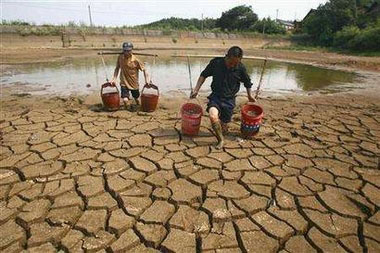Flooded China warns of heat, drought - and snow?
Updated: 2007-08-02 17:16
China, where more than 700 people have been killed in floods so far this summer, has now warned of the dangers of heatstroke and drought and said lightning killed a record 141 people last month.
 Farmers collect water from a dried-up pond in Wangcheng county, central China's Hunan province July 31, 2007. More than 1.2 million people in the central China, where more than 700 people have been killed in floods so far this summer, has now warned of the dangers of heatstroke and drought and said lightning killed a record 141 people last month. [Reuters] |
The heatstroke warning from the Central Meteorological Station and the Chinese Centre for Disease Control and Prevention said people in the south, east and northwest would be in danger on Thursday and suggested they avoid exposure to sunlight.
Severe drought in parts of China has left 7.53 million people short of drinking water, according to the Office of the State Flood Control and Drought Relief Headquarters.
The hardest-hit regions were the provinces of Heilongjiang and Jilin in the northeast, Inner Mongolia in the north and Jiangxi, Hunan and Guangxi in the south.
"In Jiangxi, where more than 1 million people face drinking water shortages, 47 counties have carried out a total of 335 artificial rainfall operations, bringing almost 500 million cubic metres of rain," Xinhua news agency said.
Drought has also caused drinking water shortages for 380,000 people in southern Guangdong.
In Heilongjiang province, a major grain base, the local meteorological station warned parts of the province may experience a once-in-50-years drought as no significant rainfall is forecast for the next week.
Other province had suffered weeks of severe flooding with landslides, mudflows and lightning killing more than 700 people nationwide.
Lightning killed 141 people in China last month, the highest monthly death toll since records began in 2000. Forecasters warned that two to three typhoons were likely to make landfall in coastal areas this month.
China on Wednesday blamed global warming for this year's weather extremes, which it said were likely to get worse and more common.
The farwestern region of Xinjiang was scrambling "squadrons" of starlings to combat a plague of locusts, Xinhua said.
It would raise the birds in artificial nests to create an "air force" to catch the locusts, which destroyed more than 3 million hectares (11,600 sq miles) of pasture each year.
Meteorological experts said the recent high temperatures increased the chances of sleet or snow.
Media reports said snow fell in downtown Beijing for five minutes on Monday -- when the temperature was above 30 degrees Celsius (86 degrees Fahrenheit) -- while rain fell elsewhere in the city.
Independent witnesses could confirm the rain, but not the snow.
|
|
|
||
|
||
|
|
|
|